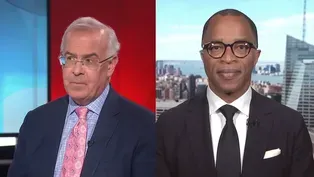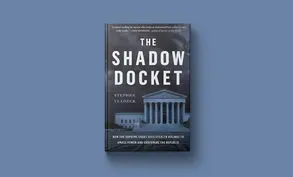
Jim Brown's life and legacy as a football great and activist
Clip: 5/19/2023 | 7m 18sVideo has Closed Captions
A look at Jim Brown's life and legacy as a football great and activist
Jim Brown, one of the greatest legends of the NFL, has died. Brown blazed an athletic path few have equaled. He left the game as its most-famous and best player to pursue a life in acting and activism as the civil rights movement rolled through the 1960s. Amna Nawaz discussed his life and legacy with Kevin Blackistone.
Problems with Closed Captions? Closed Captioning Feedback
Problems with Closed Captions? Closed Captioning Feedback
Major corporate funding for the PBS News Hour is provided by BDO, BNSF, Consumer Cellular, American Cruise Lines, and Raymond James. Funding for the PBS NewsHour Weekend is provided by...

Jim Brown's life and legacy as a football great and activist
Clip: 5/19/2023 | 7m 18sVideo has Closed Captions
Jim Brown, one of the greatest legends of the NFL, has died. Brown blazed an athletic path few have equaled. He left the game as its most-famous and best player to pursue a life in acting and activism as the civil rights movement rolled through the 1960s. Amna Nawaz discussed his life and legacy with Kevin Blackistone.
Problems with Closed Captions? Closed Captioning Feedback
How to Watch PBS News Hour
PBS News Hour is available to stream on pbs.org and the free PBS App, available on iPhone, Apple TV, Android TV, Android smartphones, Amazon Fire TV, Amazon Fire Tablet, Roku, Samsung Smart TV, and Vizio.
Providing Support for PBS.org
Learn Moreabout PBS online sponsorshipAMNA NAWAZ: One of the greatest legends of the NFL has died.
Hall of Famer Jim Brown, running back for the Cleveland Browns from 1957 through the 1965 season, blazed an athletic path few have equaled.
He left the game as its most famous and best player to pursue a life and acting and in activism, as the civil rights movement rolled through the 1960s.
Unstoppable as Brown was on the field, off the field, he led a complicated, at times brutal life.
He was arrested half-a-dozen times, mostly for domestic abuse.
He died yesterday in Los Angeles at the age of 87.
With me now to discuss his life and legacy is Kevin Blackistone, sportswriter and professor at the Philip Merrill College of Journalism at the University of Maryland.
As you well know, Kevin, Jim Brown was not only one of the best to ever play the game; he was really one of the NFL's first superstars, right?
How did he become one of the greats?
KEVIN BLACKISTONE, University of Maryland: Well, absolutely.
Any time you watch the old black-and-white, grainy video of Jim Brown or even that of him in color, you just see people trying to bring him down and being completely unsuccessful at that task.
He ran over people.
He ran through people.
He ran around people.
He was considered the greatest running back in the history of the NFL, even to this day.
Some of the records that he set still have yet to be broken.
For example, he led the league in all-purpose yards, meaning catches and handoffs out of the backfield, for five years in a row.
And many of the records he set stood for decades.
He was that much of a -- he was that much of a power.
And not only that.
I mean, just talk about his athleticism in general.
He was a four sports star in Syracuse, where he also starred in lacrosse, and he's in the Lacrosse Hall of Fame, and money consider him to be the greatest lacrosse player of all time.
He probably played about 30 games, maybe a handful more.
He scored 77 goals and had maybe 20, 30 assists.
So, this is one of the greatest athletes that we have ever seen.
AMNA NAWAZ: I mean, he was still very much in his prime, he was just 30 years old, when he decided to walk away from football.
What do we know about why he made that decision?
KEVIN BLACKISTONE: Well, he got infatuated with Hollywood and trying to become an actor.
And many of us may remember the movie "Dirty Dozen."
And that's really what pulled him into Hollywood.
And so he walked away from the Cleveland Browns to try his hand at acting.
And the owner, Art Modell, at the time started to fine him for not coming back and being ready and in shape to play -- to play football.
And, sooner or later, they parted ways.
He was truly one of the first free agents, you could say, in professional sports.
He became his own man and he refused to -- he refused to do with the Browns wanted him to do.
Jim Brown was only going to do what Jim Brown wanted to do.
AMNA NAWAZ: He also used his platform and his voice to advance the calls for equality during the civil rights movement.
Tell us about that part of his life.
KEVIN BLACKISTONE: You know, in a lot of ways, when I think about Jim Brown, I think about him as kind of being this emperor of Black masculinity, particularly coming to form in the 1960s.
And there were two -- a couple of things that really made him stand out.
One is a famous photograph of Jim Brown with Muhammad Ali and a group of other very famous Black athletes in the 1960s.
And that was called the Cleveland Summit.
It is a misinterpreted photograph, because a lot of people have said, incorrectly, that the meeting was to support Muhammad Ali's refusal to join the military, and therefore continue his boxing career.
But the real reason for the meeting, those guys, including Jim Brown, the ringleader, wanted to get Ali to drop his fight against the military, and continue as an athlete.
And one of the reasons Jim Brown wanted to do that is because, at the end of the day, Jim Brown was a capitalist, and he happened to have a business deal for Ali's next fight.
And so he wanted to get him out there.
But Ali, to his credit, stood down the most powerful Black men in athletics, and told them, no, this is what I have decided to do.
And so they created a unified front with Ali.
But that's one of the first times that we saw Jim Brown really as an activist on the Black front.
The other time was when he started a Black economic organization, which is still alive to this day, to invest in homes and real estate and business opportunities in Kansas City.
So he's had a great impact when it comes to Black capitalism in this country.
AMNA NAWAZ: Kevin, a lot of folks may remember Jim Brown also came out very publicly recently, in 2018, in fact, and had vocally and publicly supported then-President Trump, something he even said at the time would make him -- quote - - "very unpopular" in the Black community.
Did it?
KEVIN BLACKISTONE: Oh, it absolutely did.
I wrote about it at the time at The Washington Post.
And I remember that.
And I was perplexed as to why Jim Brown would do this.
But, as I just mentioned, at the end of the day, Jim Brown was very much -- very much a capitalist.
And I suspect that that fit into the reasons that he met with Donald Trump.
He was -- he thought, for whatever reasons, that Donald Trump was going to do something for Black America that Donald Trump wound up obviously never doing.
But that's the complexity and uncomfortableness of talking about Jim Brown at some point, because the other thing is, is that -- and he was dogged throughout his life, certainly, as an adult man, was being a terror to the women who he encountered in his life.
A number of times, he was -- he was accused of a battery against women.
There's a famous story about a girlfriend of his who he threw out of a -- threw off of a balcony.
He was once arrested in the '90s over domestic violence and convicted of it.
So there's a -- he was a very complex person.
He's not -- he wasn't just a great athlete.
He wasn't just this actor who played these -- oftentimes these single-name roles where he flexed his muscle and he was this Black male power figure on the screen.
There were some uncomfortable moments in his life as well.
AMNA NAWAZ: A complicated life and a complicated legacy.
Kevin Blackistone, thank you so much for joining us tonight.
KEVIN BLACKISTONE: Thank you.
Brooks and Capehart on the debt ceiling negotiations
Video has Closed Captions
Clip: 5/19/2023 | 11m 1s | Brooks and Capehart on debt ceiling negotiations and Republicans joining the 2024 race (11m 1s)
Michael J. Fox tells his own story in new documentary
Video has Closed Captions
Clip: 5/19/2023 | 8m 26s | Michael J. Fox tells story of his career and living with Parkinson's in new documentary (8m 26s)
'Shadow Docket' explores Supreme Court's growing influence
Video has Closed Captions
Clip: 5/19/2023 | 6m 38s | New book 'Shadow Docket' explores Supreme Court's growing influence on American law (6m 38s)
Syria welcomed back into Arab League after years of war
Video has Closed Captions
Clip: 5/19/2023 | 7m 27s | Syria and Assad regime welcomed back into Arab League after years of civil war (7m 27s)
U.S. will help train Ukrainian pilots on F-16 fighter jets
Video has Closed Captions
Clip: 5/19/2023 | 5m 52s | What the plan to provide F-16 fighter jets to Ukraine means for the war against Russia (5m 52s)
Providing Support for PBS.org
Learn Moreabout PBS online sponsorshipSupport for PBS provided by:
Major corporate funding for the PBS News Hour is provided by BDO, BNSF, Consumer Cellular, American Cruise Lines, and Raymond James. Funding for the PBS NewsHour Weekend is provided by...















